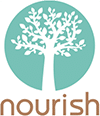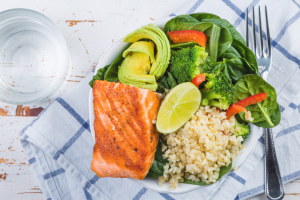Nourish Health Food Pharmacy, Pregnancy, Women's Health
Probiotics in Pregnancy and Infants
Inside our digestive system we have an ecosystem of little tummy bugs. These bugs tend to live harmoniously within us. In fact, they play a vital role in our survival. On the flipside, they can also work against us with links to autoimmune conditions, eczema, food and skin allergies. This is why it’s important we kick things off on the right foot and start cultivating a strong gut defence system right from when we are in the womb.
So, how does the gut affect the immune system?
Did you know, over 70% of the immune system is located within the gut? The gut is lined with millions of tiny super intelligent cells with little receptors that act like security guards. When something passes through, the gut receptors will detect its pattern and relay the information back to the brain to either continue as normal or start an inflammatory (or defensive) response.
This is what happens when people are allergic to certain foods. Those little receptors detect an unwanted substance within the gut and send a signal to the brain to fire up the immune system. This leads to an inflammatory response within the body and can result in a rash or hives, swelling and even breathing difficulty.
In the first few weeks of life, the receptors within the gut have reduced activity. This allows for those little baby tummies to be cultivated by a stable bacterial ecosystem. As the infant grows and solid foods are introduced, their microbiota will diversify and alter until they reach their adult-like state, around 3-5 years of life. During this time the immune system learns what is a threat to the body and what isn’t.

How does the gut microbiome develop in infants?
Over the past 20 years numerous studies have looked at the effects of probiotics on the immune system. Although there is still a lot to discover in this area of research, we do know that our gut bugs can impact our immune response and overall well being.
The original microbiota that inhabit our little tummies during our first years of life can significantly impact our immune responses in the future.
It was originally thought that a baby’s digestive system was sterile when in utero however several recent studies suggest otherwise. There is now some thought that the amniotic fluid and placenta may have an influence on the colonisation of an infant’s microbiome.
The development of the infant’s microbiota also depends on various other factors including whether they are delivered vaginally or via caesarean, whether the baby is breastfed or not, and whether they have been exposed to antibiotics. These things however are not the be-all-end-all and we have ways of helping their little tum tums build up their microbiota.

What are the benefits of probiotics in babies?
Some strains of probiotics such as Lactobacillus rhamnosus (LGG) have been shown to help downplay excessive inflammatory responses. For instance, LGG probiotics are commonly recommended for mothers to take during pregnancy and are also often seen in baby probiotic formulas to help reduce the likelihood of eczema in infants.
Some studies have also looked at the mix of probiotic strains and its effect on allergies. There is some evidence to show that Bifidobacterium bifidum, B. lactis, and Lactobacillus acidophilus could possibly reduce the prevalence of eczema in infants during the first 2 years of life.
The biggest risk factor however for a baby or child suffering with eczema or allergies is if the mother suffers with it herself. The next big risk factor would be if the father or at least one first-degree relative has eczema, asthma or allergic rhinitis. In these cases, the use of a probiotic may be recommended.
Supplementation with a probiotic can start during pregnancy as it can help influence the cultivation of good bacteria during the early developmental stages of the foetus. The mother can continue to take the probiotic right throughout the pregnancy and during breastfeeding as it can pass through the breast milk to bub. In fact, probiotic supplementation in the mother during breastfeeding can help cultivate a positive microbe compilation within the breast milk that can benefit bub.
Some other benefits of probiotics include:
- Build stronger immune system
- May help reduce frequency and duration of diarrhoea
- May reduce pain and bloating in patients with irritable bowel syndrome
Are probiotics safe to use?
There are some cautions that need to be considered when taking probiotics. Patients who are severely ill and/or are immunocompromised, and patients with short bowel syndrome should only take probiotics under close supervision from their medical practitioner.
For all other patients remember to always discuss with a qualified pharmacist, health practitioner or medical doctor before starting treatment.
Where to now?
There are a lot of different probiotic brands and different probiotic mixes available on the market. There are also some that must be stored in the fridge and others that are shelf stable. Both can be good however it is a good idea to get guidance from your health practitioner as to what one would be best for you and your baby.













